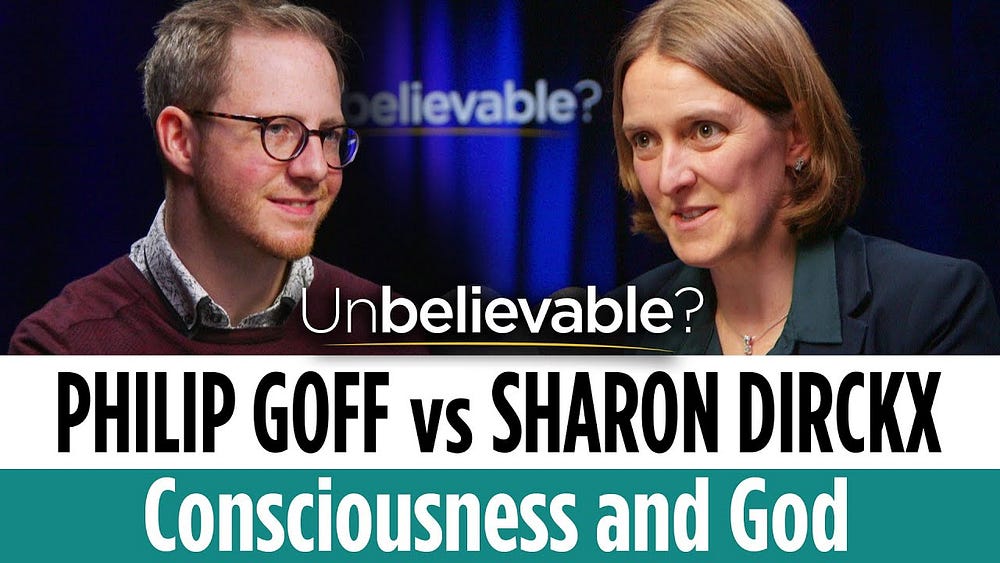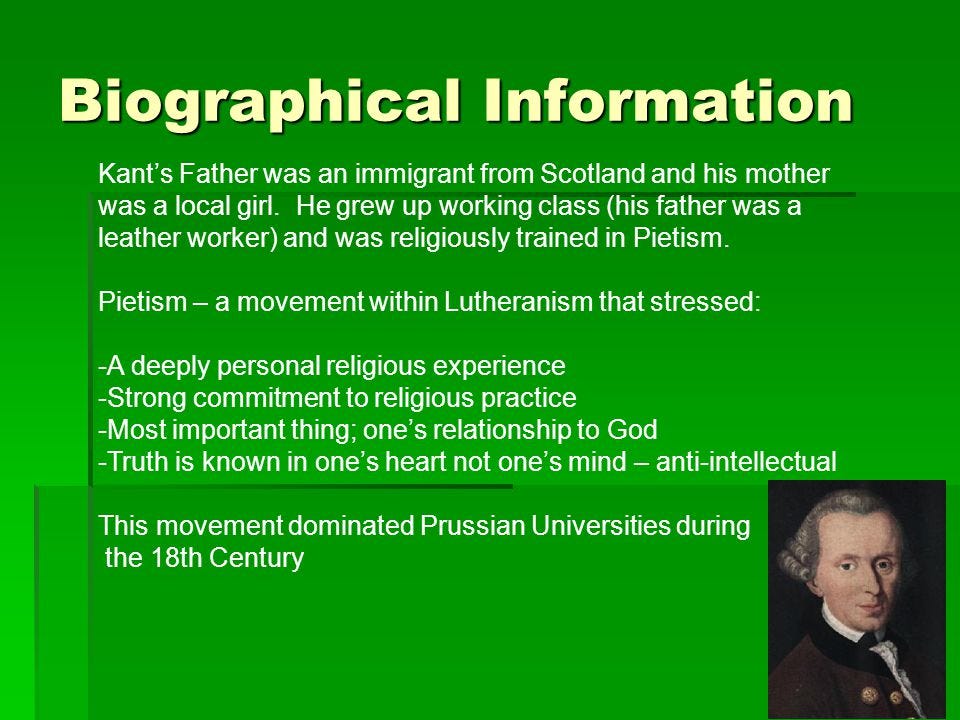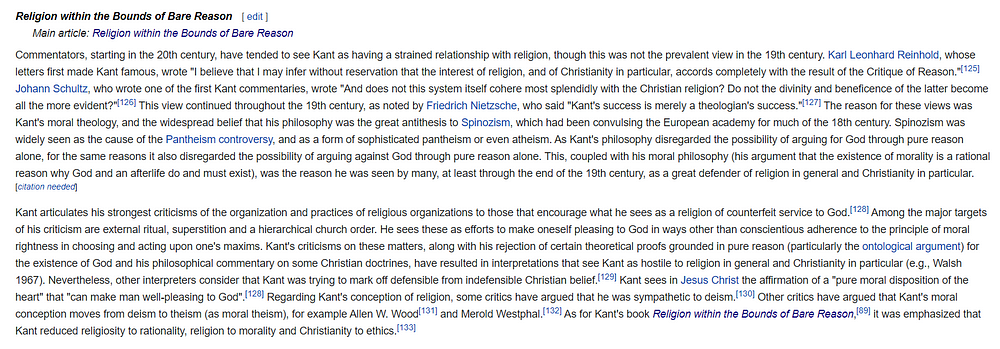“… Philippe Sollers asserts… that our private lives ‘merit investigation’: ‘What do they like? What paintings do they have on their walls? What are their wives like? How are those beautiful abstract statements translated in their daily and sexual lives?’ Well! Let’s concede once and for all that we are arrogant, mediocre, sexually frustrated scientists, ignorant in philosophy and enslaved by a scientistic ideology (neoconservative or hard-line Marxist, take your pick).
“But please tell us what this implies concerning the validity or invalidity of our arguments.”
— Jean Bricmont and Alan Sokal (in their book Intellectual Impostures)
It’s likely that straight after reading some of my words in this piece that — at least some — readers will claim that I too have an (as the phrase has it) “ulterior motive” for arguing that Philip Goff and Immanuel Kant have (or had) ulterior motives for advancing their own philosophies.
So it’s now worth making a distinction.
A Distinction Between Known and Unknown Motives

Perhaps there are those ulterior motives which philosophers are well aware of; though which they then hide or deny. On the other hand, perhaps there are also those motives (which aren’t ulterior) which are uncovered by people external to the philosophers themselves (say, by psychologists, social/political theorists, historians, etc). Indeed it can be argued that if the “ulterior motives” aren’t acknowledged by the philosopher as his own motives, then they aren’t actually ulterior motives at all.
Yet perhaps all this depends on how complex we take the mind to be and whether or not it can work on different semi-independent levels. (It’s not necessary to believe in a Freudian unconscious — or any equivalent — here.) The point is that there’s a difference between a philosopher who quite consciously has a (to use the cliche) “hidden agenda” (whether political, religious, etc.); and a philosopher who’s simply not aware of his motivations, social positioning, professional status, his place within a historical context, etc. The latter may have no idea how these things can — to lesser or greater degrees — determine his philosophical views (or at least his choice of subjects).
So if we’re talking about truly subliminal motives, then it’s clearly not worth criticising the philosopher concerned because a philosopher can’t be culpable for something he doesn’t know about. (I suspect that this will be disputed in ethics.) Of course the philosopher’s putative “hidden” motives could be pointed out to him and his reactions to this will be interesting in itself. On the other hand, the philosopher who systematically hides his overall game plan is a different case entirely.
So let’s now tackle what Philip Goff himself said about other philosophers “believing what they want to believe” (i.e., rather than him actually using the words “ulterior motives”).
Philip Goff

The contemporary English philosopher Philip Goff expressed the following when interviewed for a YouTube video:
“When we’re doing science or doing philosophy, then we should certainly be thinking about not which view we’d like to be true; but which view is most likely to be true.”
In the context of everything else Goff had said in this interview, wasn’t this a hopeless ad hominem aimed at Goff’s own philosophical opponents?
More specifically, Goff claimed that materialists shouldn’t “believe what they want to believe”. But surely that claim is against the man and not against any specific argument. Clearly Goff believes that various (though not all?) physicalists, Darwinians and scientists would “like their views to be true” and for panpsychism to be false. However, I can just as easily turn this ad hom on its head and aim it at Goff himself. That is, Philip Goff may like — or want — panpsychism to be true. After all, panpsychism has been tied to almost three-thousand years of religious, spiritual and moral beliefs/views of various kinds — not least in the video itself.
Of course panpsychists and others may dispute my claim that Goff was aiming his ad-hom statements exclusively at the critics of panpsychism. In other words, they may argue that Goff was expressing a “general approach” to philosophy and science when he talked about people wanting P to be true or false. Yet, as already stated, in the context of what Goff says in this video — and elsewhere — about the detractors of panpsychism, I simply believe that this isn’t the case. That is, Goff believes that many philosophers and scientists are emotionally against panpsychism. And, in the context of the video above, I think it’s also clear that he’s only — or at least mainly — targeting panpsychism’s opponents.

It didn’t help either when Goff said that “materialism is dismal”. Surely that’s not a philosophical comment.
I suppose none of this matters if Goff’s arguments work. However, it was Goff himself who used ad homs against others — and he’s done so on more than one occasion.
So this is where we are now.
Goff claimed — if implicitly or obliquely — that those who’re against panpsychism don’t want it to be true. And then I aimed that way of “arguing” against Goff himself by saying that he wants panpsychism to be true. In turn, it can now be turned against my own position against Goff… Consequently, many philosophers — especially analytic philosophers — may well see all this as a hopeless game.
But not so quick!
One can confront the arguments and also do some — amateur — psychology and sociology. Indeed the sociology and psychology may help us understand the arguments. So pointing out these possible motivations for believing in panpsychism (which Goff himself happily acknowledges and even cites in the video and elsewhere) may not be philosophy; but it may still be relevant.
Now let’s take the case of Kant.
Immanuel Kant


We can’t be sure how honest Immanuel Kant was being about what can indeed be called his own (as it were) ulterior motives when he wrote the following words:
“[T]here can only be one ultimate end of all the operations of the mind. To this all other aims are subordinate, and nothing more than means for its attainment. This ultimate end is the destination of man…The superior position occupied by moral philosophy, above all other spheres.”
This seems to be a statement that “moral philosophy” should be — or is — First Philosophy. (Relevantly, the mid-20th-century French philosopher Emmanuel Levinas explicitly stated that Ethics is — or should be — First Philosophy — see here.) In other words, the quote above is a more or less honest acknowledgement by Kant of his own ulterior motives. (Of course Kant would never have used these precise words about himself.) That is, he stated that “all the operations of the mind” (including, it must be assumed, all Kant’s own philosophising in metaphysics, epistemology, etc. — i.e., everything outside his moral philosophy) were nothing more than
“means for [the] attainment [of the] ultimate end [of] moral philosophy”.
So, unlike the common conception of Kant as a systematic and objective “system builder”, it can be said that Kant wasn’t working from the bottom up (i.e., from foundations), but from the top down. That is, Kant’s “moral philosophy” wasn’t born of his general philosophy. Instead, Kant’s moral philosophy gave birth to — and determined — his overall philosophical system. So no matter how systematic, coherent and internally valid (or indeed true) Kant’s philosophical system (or at least the parts or propositions thereof) is, its (as it were) First Cause was Kant’s moral philosophy.
And who’s to say that Kant’s moral philosophy (which he also admitted — if obliquely — was determining his entire philosophical system) was not itself built up from — and determined by — its own First Cause? That is, just as Kant’s moral philosophy determined his entire philosophical system, so perhaps something completely outside philosophy determined his moral philosophy. And let’s not beat around the bush here. Perhaps it was Kant’s Pietist Protestantism (or Lutheranism) which determined his moral philosophy, which in turn determined his entire philosophical system.
There is more — strictly philosophical — evidence of Kant’s religious (or moral) a priori when it came to his destruction of the Ontological Argument for the existence of God.
In this precise technical case, Kant attempted to prove that the word “‘exist’ is not a predicate”. And by so doing he believed — and many others did too — that the support underneath the Ontological Argument had been taken away. And let’s not forget here that Kant and other philosophers believed that they had previously refuted all the other “proofs” of God’s existence too.
So what were Kant’s ulterior motives for refuting the Ontological Argument?
Perhaps Kant himself told us in the following passage:
“No one, it is true, will be able to boast that he knows that there is a God…No, my conviction [that God exits] is not logical, but moral certainty… it rests on subjective grounds.”
And what did Protestants generally (or even always) believe when it came to their religious beliefs and the existence of God? They believed that it should rest on “faith, not reason”. Kant, therefore, “made room for faith” by destroying the (supposed) rational proofs of God’s existence. This too he — indirectly — admitted to in this segment:
“[T]he principles of reason…do not conduct us to any theological truths…we recognise [Reason’s] right to assert the existence of a perfect and absolutely necessary being, [but] this can be admitted only from favour, and cannot be regarded as the result of irresistible demonstration.”
Kant’s moral philosophy also squares very well with another important feature of Protestant Pietism: the emphasis on personal morality. And, as all Kantians and those knowledgeable about Kant will know, “the moral sense within us all” is essential to Kant’s ethics.
Conclusion: A Long Ad Hominem?
It can of course now be said that all the above is nothing more than an elaborate and long ad hominem. And, as already stated in the introduction, surely what matters is whether or not Kant’s system (or its propositions taken individually or collectively) is true.
For example, it may well be the case that some particular person has an ulterior motive for believing that 2+2=4. That doesn’t thereby stop 2+2 equalling 4. And even outside arithmetic this logic may still apply. For example, someone may believe x solely because he is inherently nasty or vicious. However, his statements about x may still be true.
So perhaps it would be wise to come down somewhere in the middle on this issue.
We shouldn’t believe that if a philosopher states P and that he’s also culpable in some way, then that (somehow!) makes P false — or at least probably false. And neither should we believe P is false — or even suspect — simply because it was articulated by a philosopher — or by anyone else — at a certain suspect point in history (or in a certain suspect environment) which somehow automatically invalidates P.
That said, neither should we completely ignore the aetiology of beliefs and ideas. And one reason it’s unwise to do so is that from the (as it were) context of discovery and belief (whether psychological, historical, political, etc.) we can gain a better understanding of the beliefs or ideas themselves — not only the contexts of such beliefs or ideas. The contexts, in this case, would only be a means to a (philosophical) end.
So by learning about Kant’s motives (if that’s what they truly were) we may actually gain an insight into his philosophical ideas themselves. More particularly, if we know that Kant was “making room for faith” in certain — or even all — areas of his philosophy, then that may also help us come to know what he was doing and why he was doing it.
Notes:
1) Kant wasn’t the only Pietist thinker of the Enlightenment era: there was also Friedrich Heinrich Jacobi (1743–1819). It just so happened that they took different approaches to the “excesses” of the Enlightenment. Jacobi emphasised the necessity of faith and irrational belief. Kant, on the other hand, knew that the Enlightenment mind would only accept Reason to set limits on Reason. And that was precisely what Kant attempted to do.
Kant’s pro-Enlightenment position was basically an ultra-Protestant stance against Church authority. To Kant, the Enlightenment was a reaction against a Catholic past in which there was an “inability to use one’s reason without the guidance of another”.
2) It’s interesting to see the way in which individual philosophers have set out to defeat scepticism. In other words, we may not be mistaken in being sceptical about their anti-scepticism. It can be argued that philosophers like Kant knew precisely where they wanted to go before they had even set off on their philosophical journeys. (This is often said about the studies written by academics too.) In other words, perhaps these philosophers weren’t only led by truth or sound arguments: perhaps they were also led by the desire to, say, squash scepticism.
Now Take these words:
“Kant regarded the failure to refute scepticism as a ‘scandal’ to philosophy, and offered his Critique of Pure Reason as a solution.”
Similarly, perhaps Descartes knew where he was going before he set off on his philosophical journey. More particularly, Descartes believed that God would keep His high place in the universe after all his radical philosophising. And he also believed that all globally-sceptical views would be crushed by his “method of doubt”.










No comments:
Post a Comment